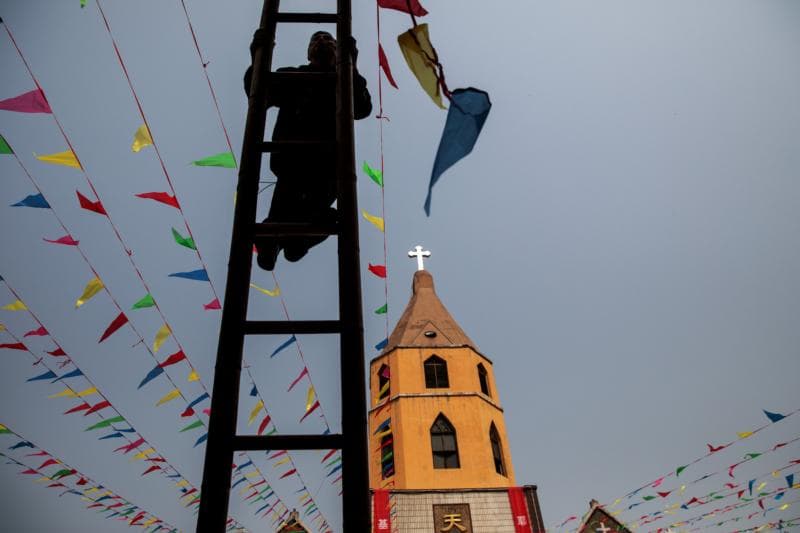TAIPEI – After losing two more diplomatic allies in recent weeks, Taiwan is becoming increasingly isolated in the international community. However, where formal diplomacy has failed, democracy is filling the gap.
Having functioned as a stable democracy since the early 1990s, Taiwan boasts itself as a modern, open-minded society where tolerance and respect for human rights are cultural staples and where citizens enjoy full freedom of speech and religion and the right to elect their government officials.
The Republic of China established diplomatic relations with the Holy See in 1942 when a diplomatic minister was assigned who arrived in Rome in 1943.
After the Chinese civil war, then-President Chiang Kai-shek fled to the island of Taiwan with his government in 1949, while the communists established the People’s Republic of China on the mainland.
Under the subsequent “One China” policy, governments have forged diplomatic relations with either Taipei or Beijing, but not both, as no country has formally recognized Taiwan as an independent country.
By the 1970s, most Western countries switched their embassies to Beijing. Currently, there are just 15 nations that hold formal diplomatic relations with Taipei.
As one representative of Taiwan’s Ministry of Foreign Affairs put it, when it comes to competing with China, “we know we can’t when it comes to diplomacy, but we have our democracy.”
Though Taipei has lost most of its diplomatic allies over what some have dubbed Beijing’s “dollar diplomacy” – the Solomon Islands and Kiribati being the latest examples – Taipei’s strategy has been touting the success of their democracy, as opposed to the mainland, where the Chinese Communist Party has garnered a reputation for rigid civic restrictions, persecution of religious communities and engaging in so-called “black PR” campaigns.
Government officials in Taipei are especially prone to emphasize Taiwan’s cultural diversity and interreligious harmony, where a sense of mutual respect governs relations between members of different backgrounds and faith communities.
Over the weekend Taiwan, celebrated its first-ever Pride Week after legalizing gay marriage in May. Since then, more than 2,000 same-sex couples on the island have married and roughly 200,000 participated in Saturday’s Gay Pride parade.
Religious freedom is a key part of its democracy promotion strategy, with several government officials contrasting the harmonious interreligious relations in Taiwan with the suspicion and pressure religious communities face in China, including Christians – one of the most rapidly growing religious communities in the country.
RELATED: Taiwanese authorities to Vatican: China deal not helping Catholics on the ground
In comments to journalists Oct. 22, Taiwanese Foreign Minister Joseph Wu said that as a whole, “We care about religious freedom,” and insisted that protecting this freedom ought to be a top priority for all democracies.
Recounting stories of Christians and Catholics who have been persecuted by Chinese authorities, Wu said that if this continues, “we all have the responsibility to try to do something to make sure Catholics in China enjoy their religious freedom.”
In Taiwan, Christians are a minority comprising just five percent of the population. “But,” as one government official put it, “we don’t take crosses off of churches.”
The three major religions in Taiwan are Buddhism, Taoism and Confucianism, though many temples tend to be a fusion of all three. Some 93 percent of Taiwan’s population of 23 million identify as either Buddhist or Taoist.
There are also a small number of Muslims in Taiwan, numbering around 6,000 in total.
Among Taiwan’s numerous aboriginal communities, the number of Christians tends to be higher. At the moment, the Presbyterian church is the most influential denomination.
Catholics themselves number around 350,000, with just 120,000 practicing. There are currently just seven acting bishops in Taiwan, with a ratio of roughly one priest per parish. Yet despite being a minority, the Catholic Church runs about half of Taiwan’s social work, mostly in the fields of healthcare and education.
Despite the fact that the Vatican is currently the only country in Europe with whom Taiwan maintains diplomatic relations, most people don’t follow the pope on a regular basis, only paying attention to major speeches or events, such as Pope Francis’s visit to Thailand and Japan set for next month.
In general, the Catholic Church in Taiwan is known mostly for its positions on gay marriage, which many find outdated.
However, ahead of Taiwan’s vote to legalize gay marriage in May, Father Otfried Chan, Secretary General of the Chinese Regional Bishops’ Conference, spoke against the move to government officials in an open session of the Legislative Yuan, Taiwan’s unicameral legislature and one of five branches of its government.
Speaking to journalists last week, Chan said that “until now” religious freedom in Taiwan is working, but noted that it is currently impossible to teach religion or formally pray in public schools, as Taiwan is insistent on being a lay state where religion is a private matter.
However, the local bishops’ conference runs a local Catholic radio station, Radio Veritas, which broadcasts in Chinese weekly, and which also produces videos that go out on YouTube.
In terms of relations with Catholics on the mainland, Chan said there is some interaction, part of which is a current agreement with Taiwan’s Ministry of Foreign Affairs allowing priests from mainland China to study in Taiwan for three years at a time, after first being vetted by the Chinese government.
So at least for the Church, diplomacy isn’t just a competition, but can lead to cooperation, too.
Follow Elise Harris on Twitter: @eharris_it
Crux is dedicated to smart, wired and independent reporting on the Vatican and worldwide Catholic Church. That kind of reporting doesn’t come cheap, and we need your support. You can help Crux by giving a small amount monthly, or with a onetime gift. Please remember, Crux is a for-profit organization, so contributions are not tax-deductible.














